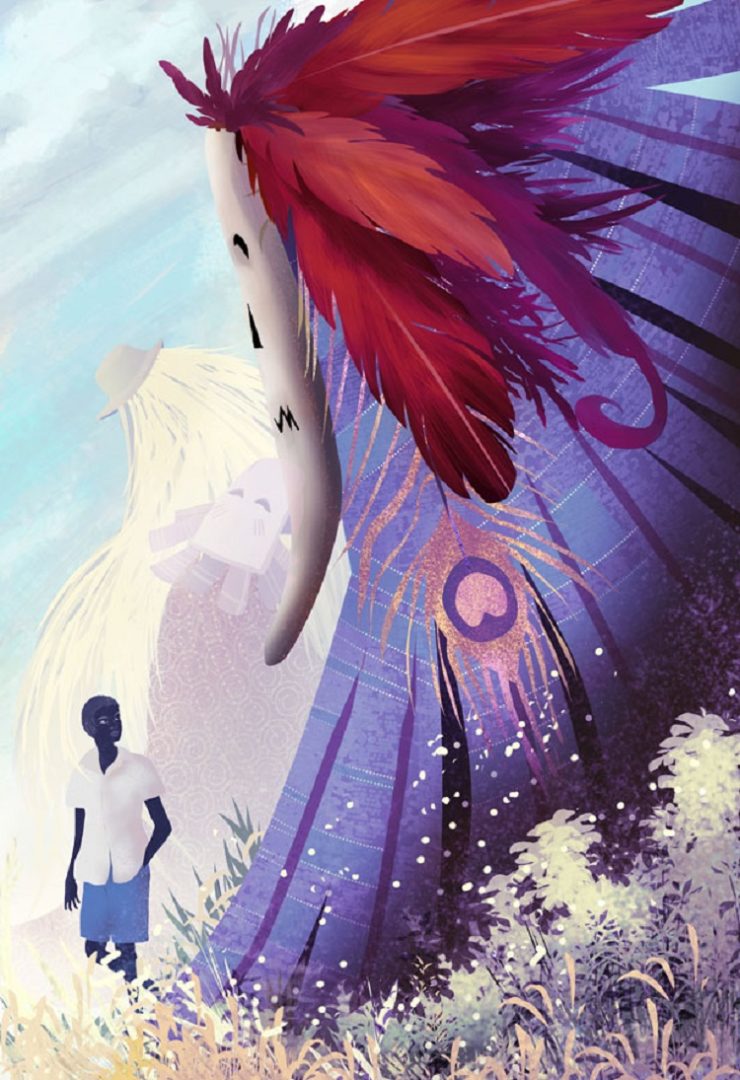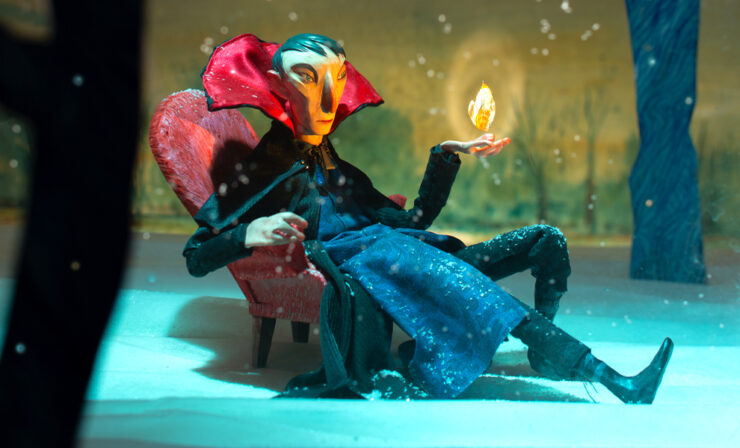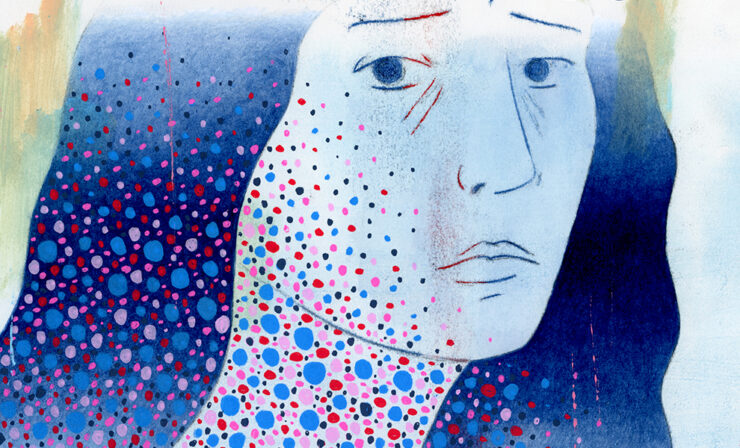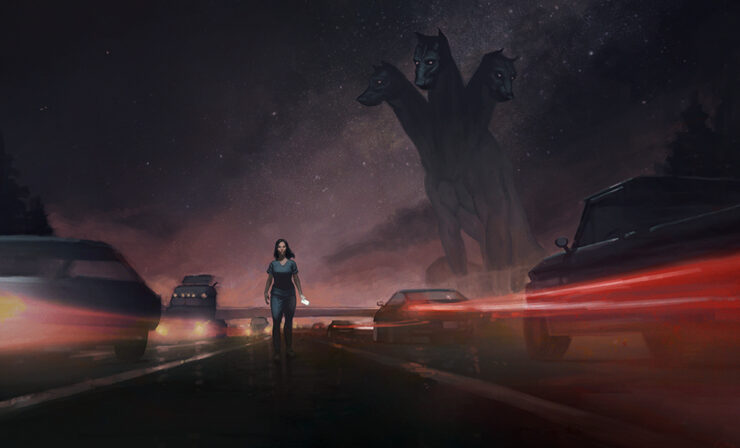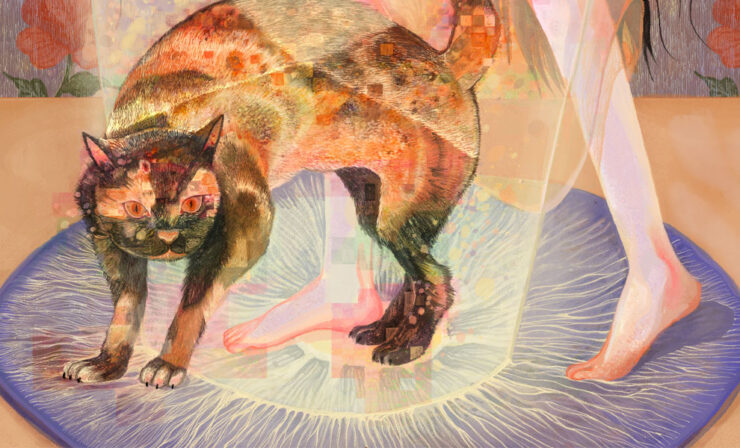Pauly is a good son. When he brings home three beautiful Masquerades, he’s expecting that his mother will be proud of him. But when his mother begins asking favors of his Masquerades, he realizes that being a good son sometimes means disobeying.
Pauly should stick to the major roads when walking home from his cousins’ house. That’s what his mother warns, abstractly, routinely, every morning of this summer holiday when she drops him off. He always nods yes, but in this one thing, he is a disobedient son. He’s tried to take the major roads home, but they are so noisy with the grumbling trucks and the plaintive honks from all the cars competing to get ahead. Pauly knows more scenic routes home, less noisy paths that wind between large houses they’ll never afford and parks his mother has no time to take him to. And when Pauly doesn’t want to take this leisurely walk home, there is a shortcut. If he dips behind the mosque down the street from his cousins’ house, scurries across the gutter bridge made of two wooden planks, slashes through some distance of overgrown bush, then hops over the abandoned rusty back gate of Alele Estate, he will burst out two streets away from home. The security guards at Alele’s main gate never question his passage; they wave at his sweaty forehead and smile at the grass stains he’s accumulated on the shorts his mother makes for him.
Pauly is trying to get home quickly today. He stayed too long, playing ball with his cousins, Ekene and John, in their huge backyard bordered by coconut trees. Behind the mosque, he startles a man at his prayers. The man stills, following Pauly’s path through the backyard as his head hovers inches above the mat. Pauly whispers an apology, not slowing down. He doesn’t doubt that the rotting planks will hold his weight, and across the makeshift bridge he goes. But today, a few steps into the bush, he stalls, almost tripping, because here are three masquerades swaying in front of him, blocking his path. Pauly is not aware of any masquerade festivals at this time of the year; he takes a small step back, contemplating the out-of-context figures.
“Excuse me, please,” he says, because his mother has taught him to be polite.
The masquerades don’t respond. They stand there, moving left to right, then left, like backup singers at church. Pauly has to tilt his head all the way back to see the tops of their heads. The first masquerade is the tallest, even taller than his science teacher, who is a very tall 6’4” – —a detail the man crows at his short students. The tall masquerade has a body of long raffia threads layered over each other—like someone has stacked fifty-six brooms and topped them all with a brown cowboy hat, the kind Woody in Toy Story wears. It has no face. The second masquerade is just a little taller than Pauly’s mother. It is draped in rich aso-oke, the bloodiest of reds. Pauly gawks at the twinkling beads sewn into the cloth, dangling and scattering light, but his attention cannot stay long away from its square silver face with twin black elliptical slits above three gashes of tribal marks on each cheek. Though the head of the third masquerade is a solid dark wood that takes up half its body length (with a chiseled triangle nose, engraved circles for eyes, carved zigzags for teeth), there is an explosion of colorful feathers around it. The feathers are blue and purple and red and yellow and pink and they are long and different, as if all the birds of the world have donated feathers for this purpose. Its skirt is made of several panels of cloth, each with an elaborate embroidered pattern.
Buy the Book
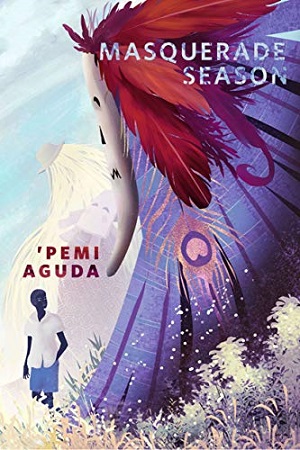

Masquerade Season
When they keep shifting with the wind, not responding, Pauly moves to go around them. They don’t stop him. How strange, he thinks, and keeps running; but isn’t that a rustling following him? Pauly swings around and the masquerades halt, only a few steps behind.
“Why are you following me?” Pauly asks.
It is the feathered masquerade that speaks; the voice is a whispery, susurrating sound, as if the feathers themselves are speaking. The masquerade says, “Because we are your masquerades.”
In the middle of this bush path, a shortcut to Pauly’s home, he thinks how he has never owned anything so special and vivid and big. His mother will be proud. His cousins will be impressed.
“Okay,” Pauly says, and takes them home, checking over his shoulder at every corner to make sure they are still there, tall and conspicuous and all his.
The masquerades are swooshing in the corner of the living room, between the old TV with the crooked antennae and the heat-trapping velvet curtains that Pauly’s mother keeps forgetting to replace. The masquerades are so bright, too bright maybe, for the otherwise dim apartment, and Pauly, seated on the edge of the sofa, sometimes has to look away, afraid his eyes will rupture from color.
It wasn’t hard getting the masquerades home. They moved through the bush without problems, hopped over the gate gracefully—as if they were featherlight; when the Alele security guards had seen Pauly and the masquerades approaching, they waved and asked: “And what do we have here?” To which Pauly replied, “These are my masquerades,” and the masquerades had swayed and Pauly liked the way the guards nodded, touched their cap visors to show they were impressed.
His mother has warned him not to bring strangers home, yes. So, in this second thing, he is a disobedient son. But Pauly is sure she will understand that masquerades aren’t things you pass up, especially when they belong to you. And isn’t it his mother who always says never to leave his belongings lying around? Never to lose them?
Pauly doesn’t know what appropriate conversation with masquerades sounds like. Should he ask where they have come from? Would that be impolite? Would that be looking a gift horse in the mouth? Or should he ask what they do for fun? They don’t look like they’d want to play football, staining their materials, which have somehow stayed clean through that bush passage. But maybe he shouldn’t presume. Are they similar to pets he has to feed?
He finally speaks up. “Can I offer you biscuit and water?”
The red aso-oke masquerade bends forward, cloth rippling like a wave, then straightens. This voice is soft too, but more slippery, silkier than the feathered masquerade’s. “Palm oil,” the masquerade says from behind its silver mask.
“You want palm oil?”
“Yes,” it says, the s slinking out, drawing long. “Only palm oil.”
Pauly’s mother arrives from her seamstress job in the middle of this conversation.
“Oh,” she says when she steps into the room, lugging bags of vegetables and fish for dinner in one hand and bolts of fabric in the other. She stands there for a long moment, looking at the masquerades, her body not quite in or out. “Oh,” she repeats. “We have company?”
“These are my masquerades,” Pauly announces. He stands tall, all of his ten-year-old height. He spreads his hands toward them, as if they are an art project of his making. He waits for his mother to be impressed.
But she says nothing, just enters the living room fully, shutting the door with her foot. She walks past them to the kitchen and dumps her purchases on the counter. She is in there for a few minutes while Pauly squints at his masquerades, wondering if their sparkle has somehow muted, wondering how she is not standing beside him, in awe of these shades and textures.
She reappears at the door to the kitchen, holding a knife. “Does this mean I have to make dinner for five?”
“No,” Pauly answers, happy not to add to her troubles. “They only eat palm oil.”
“Good,” his mother says, returning into the relative darkness of the kitchen. “Good,” Pauly’s mother repeats. “Because I’m tired.”
Pauly’s cousins want to know what the masquerades can do. They stand really close to the softly moving figures in their backyard, football suspended. The boys reach fingers out to touch Pauly’s masquerades, but withdraw within inches of actual contact.
“I don’t think they need to do anything!” Pauly responds, annoyed that the boys cannot just glory in the glistening of the beads, the luster of the raffia, the vibrancy of the feathers. “They’re masquerades.”
That first night had been weird, having the masquerades in his room, stuck in the corner with all his action figures and Lego. But after he had startled awake several times, the rustling of the first masquerade’s raffia began to soothe him; the moon snuck in through a gap in his curtains and passed through the beads on the aso-oke, and they refracted light, dotting the walls and ceiling of Pauly’s room with stars; the embroidered patterns on the third masquerade’s skirt seemed to him like complete stories in a secret language known only to him, the silver threads glinting alive in the night.
“Jeez, calm down,” Ekene says now, walking away from Pauly and his masquerades. “They’re cool and all, but if they’re just going to stand there—”
“Whatever,” Pauly says. He doesn’t need to be here with his cousins when he has three masquerades. “I’m going home,” he announces. The masquerades glide behind him, as if backing his decision.
On the streets, Pauly kicks pebbles. The masquerades are quiet and now he regrets leaving his cousins.
“But is there anything you can do?” he turns to ask.
At first, he is sure they are ignoring him, but then the red aso-oke masquerade does the wavy thing again, silver head bowing down, then lifting up. The raffia masquerade hops and spins around on the spot. The feathers on the third masquerade rise, like a bird getting ready for flight—the feathers stick out in their million directions and Pauly steps back.
The masquerades dance. Out in the street, they twirl and contort and somersault. Pauly feels transformed, transported to another world, a brighter one than his summer holiday has given him so far, more radiant than the heady rush of scoring a goal against Ekene. The masquerades feint left, then jerk right, they jump and fold and twist and spasm and feathers flutter and cloths flap and billow and beads clink and jangle and the plumes blur and raffia palms create a ssshhhh-shhshshshh wind that is the background pulse of their dance.
Pauly’s mother leaves her sewing machine for the evening and comes to sit with him. He is watching a movie about a group of teenagers solving crimes with their pet dragon. Static horizontal lines flicker across the screen intermittently, eclipsing their adventures.
Pauly moves to sit on the floor beside his mother’s legs, leans his head against them. It is rare that she pauses work to be with him. In this moment, he is happy. The masquerades are next to the TV, swaying as usual. There is an almost-empty bowl of palm oil at their feet. It is Pauly’s favorite bowl, the one with the robots holding hands. Pauly had spent a huge chunk of his afternoon staring at the bowl of palm oil, trying to catch them eating, but whenever he looked away or dozed off, he found the oil depleted. Now, he allows them their privacy and mystery.
He has his masquerades; he has his mother: it is a tranquility Pauly revels in.
His mother runs her hand over his head slowly. “Pauly?”
“Mhmm?” The idyllic moment is lulling him to sleep.
“I’m working on this project now. I’m making a dress for that Nini Edoh actress. You’ve heard of her? It’s for an awards show.”
Pauly shrugs.
“Well, she’s a big deal. And if she likes this dress, I will get plenty of clients and maybe we can move to a bigger house, you know, with a big backyard where you and Ekene and John can play football.”
“That sounds nice,” Pauly drawls, his voice slurring.
“But I need something from you.”
“From me?” Pauly perks up. His mother expects things from him—to be polite, to wash the dishes, to be home before she returns from work—but she has never needed anything from him. Pauly sits up, wiping sleep away. “What?”
“I think the raffia on your masquerade would make a wonderful belt. I need just a little bit of it, you know. I’ve never seen raffia like that before. It’s so shiny and smooth! It will really pop against the orange of the dress.” His mother sounds out of breath; it makes Pauly wince.
He turns to look at his mother; the TV lights are traveling over her face and he can see her stare fixed on the masquerades’ corner, and Pauly understands it is them she’s been watching all along. “Oh, I don’t know,” he says. “You’ll have to ask them.”
“But they’re your masquerades,” Pauly’s mother reminds him. “You can do whatever you want.”
Pauly crawls to kneel in front of the masquerade his mother is eyeing. The raffia really is lush and long and lustrous; Pauly has always known this. “Can I talk to them first?” he asks his mother.
“Of course, of course,” his mother says, leaving the room.
Pauly cannot look up at the raffia masquerade’s visage. He stares instead at its bottom, where its feet would be, the raffia threads sweeping against the floor in slow motion. “Is it okay if my mum takes some of your threads?” he asks. “I’ll make sure it’s not too much. She needs it for her job.”
The raffia masquerade keeps moving, never still; it says, “We are your masquerades.” Its voice is like a drum, deep and reverberating through Pauly’s chest.
“Okay,” Pauly says, and calls his mother in.
She is already holding a pair of scissors, and she is smiling as she approaches them. She is gentle with the masquerade, smoothing a hand over it the way she had rubbed Pauly’s head, weighing the threads, sifting through them, smiling wider. “Yes, this will do very well,” she says, and when her scissors snip loudly, Pauly looks away.
Pauly isn’t sure if he is seeing this right, but the next day, it looks like the raffia masquerade is leaning a little, tilting, no longer as tall as his science teacher. Are the feathers of the third masquerade wilting? Is the aso-oke of the second masquerade duller, less red? When he pours from the keg of palm oil into their bowl, he keeps pouring until it overflows, the red oil running across the illustrated robots’ hands.
Pauly’s mother comes home around noon, earlier than ever. She says the actress loved the belt and has referred her services to all her friends. Pauly’s mother is so happy, grinning so wide that her pink gums are exposed. She wants to take him to Sweet Sensation to celebrate. Pauly is excited. They haven’t been out to eat in forever. He wears his favorite sneakers, he brushes his tight coils; then he and the masquerades stand by the door, waiting.
“Oh, Pauly,” his mother says when she emerges from her room, applying lipstick, dangling her car keys. “I don’t think your masquerades should come. This is mother-son time, and the restaurant might be crowded.”
Pauly looks to the masquerades and before he asks, there is that whispery voice saying, “We are your masquerades.” And Pauly knows he can tell them to stay. He does. “Stay,” he says, and his mother takes his hand.
At the restaurant, when Pauly’s mother says yes to him getting both ice cream and an egg roll alongside his yamarita, everything tastes chalky. He swallows hard as his mother calls him her good and perfect and obedient son. He nods at his mother’s promises: a new house, a new bicycle, more time together.
Pauly guides his masquerades on a tour through one of the neighborhoods where he takes his leisurely strolls. They noiselessly follow him through the cleaner streets with the tall palm trees, and grass that looks too green to be real. The raffia masquerade is still tilting, but not by much. The colors seem to have replenished themselves in the feathers, in the aso-oke. Pauly is glad.
“Look,” he says, pointing at the white house with two fat columns holding up a balcony. The wrought iron gate surrounding the compound is painted gold. “We can have a house like that and we can all stand up there and look down at the street and there will be space to dance in the backyard and play football.”
The masquerades sway beside him, silent.
When Pauly’s mother asks for a strip of the red aso-oke, Pauly starts to cry.
“Why are you crying?” she asks, folding herself to sit next to him on the floor. She strokes his head; the smell of her stale sweat mixed with the smell of the lubricant she uses for her sewing machine envelops him.
“It’s not fair!” Pauly says.
His mother leans back, away from him. “Not fair?”
“They don’t like it,” he explains. “They didn’t like it when you cut before.”
“Did they tell you that?” And when he doesn’t respond to this, his mother goes on: “They are yours. You can do what you want. What will a little bit of fabric hurt?” She turns to look at the masquerade beside the TV. “Look at that thing.” Her voice sounds breathy again. “It probably has up to forty yards of aso-oke on it. I’m asking for only half a yard, Pauly.”
Pauly cries harder. He can still hear the snip of the first cut, can see the way the masquerade tilted afterward. “I don’t . . . want you . . . to do it.” Hiccups punctuate his sentence.
“See, it’s a big woman who wants this dress that I’m making o. She is Iyaloja of Balogun. Do you know what that means?”
Pauly shakes his head.
“It means that if this goes well, we’ve made it. I get an in with their market association. Look, Pauly, don’t you want me to spend more time at home? Don’t you want Ekene and John to come over, instead of you always going there? This single mother life is so hard, Pauly, I just want us to be happy. I want things to be easier for us both.”
Pauly cries some more as he nods, and his tears blur so that the scissors going through the red aso-oke look like a knife slicing through blood.
On the way to his cousins’ house, Pauly begs his masquerades to dance.
The masquerades bend and rise, as if bowing again to Pauly, but they do not jump and twirl and somersault this time. They sway, at first slowly, and then faster. They sway left and right, their heads almost touching the ground before they go in the reverse direction. The feathers do not spread out in glorious performance; they droop behind the wooden head. The cowboy hat has a crooked rim. The silver face doesn’t reflect the sun; the slits darken. There is no crackling of raffia, no clinking of beads; there is silence as they move through this muted dance, this slouching, mournful dance that makes Pauly want to cry. “Stop,” he whispers, and they do.
When he gets to his cousins’ house, they are dressed to follow him home. Apparently, his mother has called ahead, mentioning a surprise.
They all walk back to Pauly’s house, using the major roads. Pedestrians stop to stare and frown at these wilting masquerades. Pauly wishes his hands were wide enough, that he were big enough to protect them from these looks, to gather them into his arms and console them.
In Pauly’s living room is a new TV. It is flat and slick and takes up most of the wall. The masquerades glide to their corner, which is now half of what it used to be. Pauly flinches at how cramped they look, feathers sticking into aso-oke and aso-oke cloaking raffia and raffia tangling with feathers. But the TV comes on, and for the first time, the hues on the TV are brighter than Pauly’s three masquerades.
Pauly’s mother knocks on his room door and he knows what she wants.
“It’s the governor’s wife, Pauly!” She sounds excited, her voice pitching higher as it reaches Pauly through the wood.
He doesn’t respond. The masquerades are by his toys. They are still swaying, but barely, like they are tired.
“I just need a few feathers, my darling boy. I’m doing a neck detail that will stun everybody! This is it, Pauly! I can feel it. Our lives are about to change!”
Pauly climbs down from his bed, softly, so his mother doesn’t hear his movements. He slowly pushes Lego aside so that there is space to sit in front of them. He buries his head in his palms and they all bend, his masquerades, they swoop low and around him. He can feel all their textures tickling his neck, brushing his arms, rubbing his head.
“Are you sleeping, Pauly? I know you’re not sleeping. Open this door! You’re being disobedient! You’re ignoring your mother!”
Pauly stays quiet in the cocoon of his masquerades.
“I just want what’s best for us, Pauly.” She knocks again. “Okay, I’ll make you pancakes for breakfast in the morning and we can talk about it.”
His mother shuffles away and Pauly remains in their embrace. He knows now that it will never end. A feather here, two yards of aso-oke there, three more raffia threads—until there will be nothing of them left.
Pauly lies awake that night, watching the beads of the aso-oke refract stars across his face. He listens to the ssshhh-shhshhh of the rustling raffia masquerade. He traces the stories on the feather masquerade’s skirt. Pauly doesn’t sleep.
At first morning light, Pauly and his masquerades slip out of the house. It is a somber walk to the bush where Pauly first encountered them. The security guards of Alele Estate are asleep on duty. They walk past their snores.
Pauly stands opposite his masquerades in the bush. A bulb behind the mosque shines light through the dim dawn, glinting off the beads, falling on the woven texture of the aso-oke, highlighting the colors of the feathers.
“You have to go,” Pauly says to his masquerades. He has to stay with his mother, be her obedient son, but why should they have to sacrifice themselves for an ideal lifestyle?
The masquerades do not go. They sway in front of him.
“We are your masquerades,” they say together, whispery and silky and reverberating.
Behind Pauly, the muezzin’s call to prayer rings out, a long-held note rising and dipping.
“Then you have to obey,” Pauly says. “You have to go.”
Still, they don’t leave. They shuffle closer to Pauly, sinuous, silent.
“You have to go!”
“We are your masquerades.” Their movement intensifies, becomes faster. They dip left then right. “We are your masquerades.”
“Please, go.” Pauly’s voice breaks into a whisper.
The fluid, drooping dance slows down and they bow, the tops of their heads brushing Pauly’s; they crowd in, textures and patterns and colors surrounding the boy.
The rustling starts when they move away from him. Pauly doesn’t want to watch, but he forces himself to. At first, they just keep swaying, slower, but then the raffia masquerade twirls and the feathers on the third masquerade rise, pointing in all the directions, and there—the beads are clinking again. The masquerades somersault and spin and contort, tones blurring, threads swishing, free and full, dancing into the morning sun.
Buy the Book


Masquerade Season
“Masquerade Season” copyright © 2021 ‘Pemi Aguda
Art copyright © 2021 Akem










